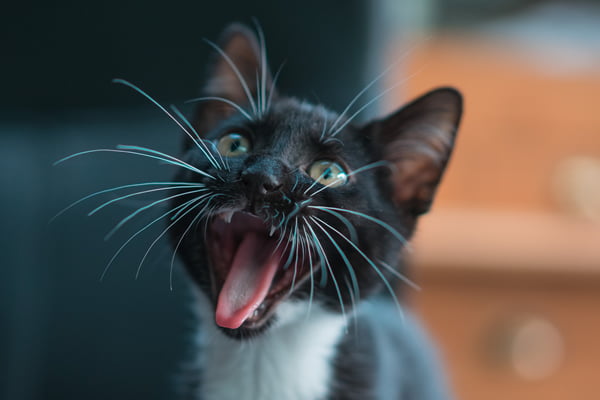When a cat suffers from a dental problem, it can make them stop eating and that can quickly lead to serious health problems. We offer cat dental cleaning at Central Texas Animal Hospital in Pflugerville so that your feline friend can enjoy the best quality of life possible.
Dental Hygiene
Dental exams, routine use of dental hygiene products, specially designed dental-health diets and professional dental scaling/polishing are important for a healthy mouth.
If the tartar is not removed, it builds up under the gums. It separates the gums from the teeth to form “pockets” and encourages even more bacterial growth. At this point, the damage is irreversible, and called “periodontal” disease.
Periodontal Disease in Cats
Periodontal disease can be very painful and can lead to:
- loose teeth
- abscesses
- bone loss or infection

As bacterial growth continues to increase, the bacteria may enter the bloodstream. This can cause infection of the heart valves (endocarditis), liver, and kidneys. If treated by your veterinarian with special instruments and procedures, periodontal disease can be slowed or stopped.
Preventing Cat Dental Disease
Gum disease, an abscessed or cracked tooth, or any other type of dental problem can cause a cat to lose her appetite. Since cats’ bodies generally don’t store much fat, they can quickly start to develop serious health problems if they stop eating. Anytime your cat stops eating, it’s a good reason to call the vet’s office.
An annual cat dental cleaning also helps to keep gum disease and other oral problems at bay. An infection beneath your pet’s gum line can spread through the bloodstream to other organs in the body, leading to a need for emergency care. Cleaning and exam allow your vet to spot problems early, so they don’t develop into more serious health issues later on.

Cat Dental Cleaning Procedure
A cat dental cleaning is a procedure that does require anesthesia. This prevents your kitty from getting scared or anxious while her teeth are being worked on. It also keeps you and the vet safe from getting scratched or bitten. Cats obviously don’t understand why their teeth are being worked on, so the anesthesia helps to keep them still and calm.
The veterinarian will scrape excess plaque or tartar off the cat’s teeth before giving them a good polish. Your cat will also receive a fluoride treatment, much like when you have your teeth professionally cleaned at the dentist’s office. A sealant is also applied to the teeth that will protect the treatment for a couple of weeks.
At-Home Cat Dental Care
Caring for your cat’s teeth really needs to begin at home. Central Texas Animal Hospital can recommend cat toothbrushes and other tools to help care for your pet’s teeth. It can take some getting used to, but eventually, most cats will allow their owners to give them a daily tooth brushing. When your cat gets older, your vet might also recommend switching to wet canned food, which will be softer on their teeth than dry kibble.
If it’s time for some cat dental care for your pet, call our office to schedule an appointment!
We are proud to be a top-rated veterinarian in Pflugerville – Click here to check out our 5-star reviews!

